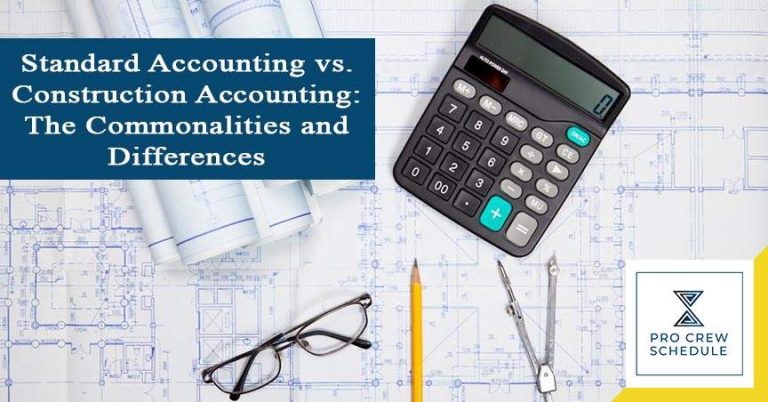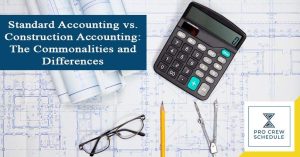Accurate and efficient accounting is essential to success in construction, like any other industry. However, despite being founded on average accounting principles, accounting for construction is a specialized discipline due to the unique way construction firms operate and how complex the projects are.
Construction accountants manage the profitability and expenses of large, individual construction projects versus product lines, for instance, while helping their companies manage industry practices such as specialized billing, retainage, and revenue recognition strategies and keeping track of frequent change orders.
Knowing that construction accounting involves heavy and specialized concepts, it usually requires technical accounting skills to pull off.
Standard Accounting vs. Construction Accounting
Though construction accounting uses the same basic principles as most industries, it involves a set of industry-specific concepts and challenges. For instance, construction companies usually aim to guarantee that each project is profitable, which only strengthens the importance of accurate job costing.
Additionally, projects are often one-off and large, so the higher management must get the numbers right on the first try. This is particularly challenging since a company’s projects are distributed across multiple locations, use a remote workforce, and are prone to fluctuating costs. Due to the introduction of remote operations and digitized systems, some accountants in construction also opt to cloud computing and documentation when crunching numbers.
Furthermore, construction accountants typically need to manage billing and revenue recognition for multi-year projects that may go through many changes over their lifetimes.
1. Project-Based
Unlike business in other industries like manufacturing or health, construction accounting generally focuses on unique projects, each of which must be computed and managed for profitability.
Estimating quotations to be competitive while still being profitable and keeping them on track can be challenging due to the complex intricacies of each construction project.
For instance, material and labor costs and the percentage of taxes can vary depending on the building type and location. Furthermore, contractors handle resources simultaneously among many projects, each with its schedule.
2. Production is Mobile and Centralized
In the construction industry, production generally happens on project sites instead of a single fixed location. Equipment and workers move from one site to another, so companies must be able to account for the costs of transportation and moving and setting up equipment.
The company must also comply with local regulations and wage scales at each construction site. It may need to purchase building materials or rent machinery from outlets near each jobsite. Many contractors choose to rent rather than purchase equipment, and lease accounting is accompanied by its challenges.
With the help of construction project software, workers are given access to and enter information in the field to help companies stay updated in real-time on project progress and cost.
3. Irregular direct and indirect costs
Continuously irregular direct and indirect costs make it very hard to estimate project expenses regardless of the scale. The price of materials and labor can change significantly during a project’s lifecycle, and those changes are often unpredictable. Contractors are specifically vulnerable to fluctuating costs for materials since it is risky to stockpile building supplies in advance. Indirect expenses, such as insurance and administrative overhead, are also affected and can change during a multi-year contract.
4. Fewer Projects
Construction companies — particularly those managing large-scale projects like commercial or government infrastructures — may win only a few bids yearly. Thus, a report of accounts for construction contractors will look different from a retail supplier or hospitality business. Sales employees will also be compensated differently, and accounting needs to pay more attention to the financial health of potential clients.
5. Long-term, flexible and irregular contracts
Big construction projects tend to be lengthy, with multiple accounting periods that can span years. Even smaller projects can stretch out by unexpected issues such as raw building material shortages or unfavorable weather. To guarantee adequate revenue and keep track of the cash flow throughout a project’s lifecycle, contractors usually need to manage a schedule of numerous payments on work completed to date in each project respectively.
One of the tools to keep on top of these overlapping timelines is incorporating construction scheduling software in their company. This way, their whole team can have one centralized platform where everyone can see the tasks that need to be done and the schedule of a given team member.
6. Change Orders
For most construction contractors, change orders are common rather than the exception, and it’s usually expected on projects with longer timelines. If they’re not managed efficiently, they can cut into project revenue. It’s critical to accurately compute the financial impact of each revision to the project as a whole, which isn’t always easy since contractors often start the change orders before they’re awarded or formally approved. Typically, a contractor should properly document an agreed change order process in the initial project contract.
7. Profitability is Uncertain
Predicting whether construction projects will be profitable is harder in construction than in industries such as manufacturing or retailing because of the abovementioned factors. Each project brings challenges while fluctuating expenses and change orders during construction further complicate the picture.
This highlights that accurately accounting for expenses is key to knowing whether projects make a reasonable profit, break even or even lose money.
Accounting Concepts that Are Applied in Accounting
Construction is never without numbers, with accounting always in the picture. Some of the concepts in accounting practice adopted in the construction industry include peculiar concepts that highlight the specialized requirements and procedures of the building industry. These concepts comprise the entire project lifecycle, from estimating BOQs to billing subcontractors and revenue recognition.
1. Job Costing
Since each project operates as its profit center, accurately tracking all project costs is an essential aspect of construction accounting. Determining the total cost of finishing each job to the contracted groups is commonly known as job costing. Contractors use this as a reference for estimating, billing, and evaluating whether in-progress projects are on track with the billings.
2. Prevailing Wage
Contractors handling public projects must pay government-defined minimum wages according to the type of worker. These are “prevailing wages” since they are based on surveys of what workers are paid to do similar work in other regions. Three of the most common prevailing wages are union payroll, multi-state payroll, and compliance reporting.
3. Accounting Methods
a. Cash Basis Method
The cash basis method is the simplest method of recognizing contract revenue in the construction industry. With this approach, you record revenue only when you receive payment and record expenses only when you pay them.
b. Percentage of completion method
The PCM or percentage of completion method allows contractors to recognize revenue as they reach a certain milestone indicated in the original contract. Contractors who work on multi-year contracts tend to gravitate to this accounting method.
c. Accrual Basis
Accrual basis accounting enables you to record revenue when earned and expenses incurred, regardless of the actual date money actually changes hands.
d. Completed Contract Method
With the CCM or completed contract method, contractors recognize profits, revenue, and expenses only when the project is completed. One advantage of this method is that a contractor can defer revenue to a later period, thus reducing tax liability in the current time. However, contractors may only use this method in limited circumstances, such as home construction projects.
4. Contract Revenue Recognition
Revenue recognition is deemed a foreign concept to most contractors, mainly because of the long-term nature of many construction projects. The revenue recognition method options a contractor opts to use depend on factors such as the type of projects the company works on, the size of the contractor’s business, and the project duration.
5. Contract Retainage
The portion on the agreed-on project price withheld until the job is finished or after a specified period is commonly known as retainage. This traditional and long-standing practice aims to build a financial incentive for contractors to complete the project satisfactorily and protect clients if problems arise. Retainage amounts are standardized, usually 5% to 10% of the contract value.
Retainage is adopted for both public-sector and private-sector projects.
6. Construction Payroll
In other industries, wages are set simply by surveying the minimum wage requirements for different roles and local market rates in general. Even though that’s also applicable for some construction jobs, certain rules apply to public projects and the use of union labor.
Additionally, contractors must comply with various labor laws provisions and local taxes.
Key Takeaway
Accounting may look daunting since it is a whole other world from construction, but it is essential to do business. In addition to the fundamentals of accounting concepts, like debits and credit statements, contractors have additional aspects to consider and account for.
One effective way to make this as seamless as impossible is introducing project management software, such as Pro Crew Schedule, ensuring the schedule of payments, the release of payroll, documentation of billings, and consolidation of BOQs/BOMs are all in one place. This way, you can invest your time in other tasks on-site.
Take the first step with the best construction management software to help you with your accounting worries and everything that comes with managing a project.
Start with Pro Crew Schedule with a 30-day free trial today.







